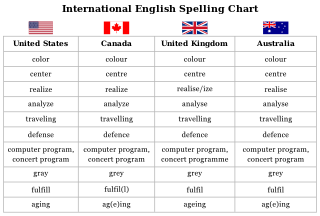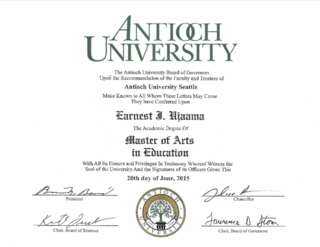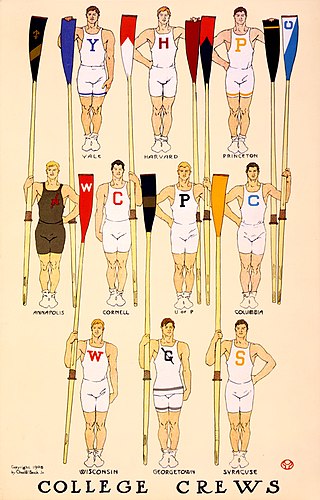Related Research Articles

The English language was introduced to the Americas by British colonisation, beginning in the late 16th and early 17th centuries. The language also spread to numerous other parts of the world as a result of British trade and colonisation and the spread of the former British Empire, which, by 1921, included 470–570 million people, about a quarter of the world's population. Note that in England, Wales, Ireland and especially parts of Scotland there are differing varieties of the English language, so the term ‘British English’ is an oversimplification. Written forms of ‘British’ and American English as found in newspapers and textbooks vary little in their essential features, with only occasional noticeable differences.

A college is an educational institution or a constituent part of one. A college may be a degree-awarding tertiary educational institution, a part of a collegiate or federal university, an institution offering vocational education, a further education institution, or a secondary school.

Jonathan Swift was an Anglo-Irish satirist, author, essayist, political pamphleteer, poet, and Anglican cleric who became Dean of St Patrick's Cathedral, Dublin, hence his common sobriquet, "Dean Swift".

An honorary degree is an academic degree for which a university has waived all of the usual requirements. It is also known by the Latin phrases honoris causa or ad honorem . The degree is typically a doctorate or, less commonly, a master's degree, and may be awarded to someone who has no prior connection with the academic institution or no previous postsecondary education. An example of identifying a recipient of this award is as follows: Doctorate in Business Administration (Hon. Causa).
Rivalry between the Universities of Oxford and Cambridge is a phenomenon going back many centuries. During most of that time, they were the only two universities in England and Wales, making the rivalry more intense than it is now.
An ad eundem degree is an academic degree awarded by one university or college to an alumnus of another, in a process often known as incorporation. The recipient of the ad eundem degree is often a faculty member at the institution which awards the degree, e.g. at the University of Cambridge, where incorporation is expressly limited to a person who "has been admitted to a University office or a Headship or a Fellowship of a College, or holds a post in the University Press ... or is a Head-elect or designate of a College".
The Regius Professorships of Divinity are amongst the oldest professorships at the University of Oxford and the University of Cambridge. A third chair existed for a period at Trinity College Dublin.
A collegiate university is a university in which functions are divided between a central administration and a number of constituent colleges. Historically, the first collegiate university was the University of Paris and its first college was the Collège des Dix-Huit. The two principal forms are residential college universities, where the central university is responsible for teaching and colleges may deliver some teaching but are primarily residential communities, and federal universities where the central university has an administrative role and the colleges may be residential but are primarily teaching institutions. The larger colleges or campuses of federal universities, such as University College London and University of California, Berkeley, may be effectively universities in their own right and often have their own student unions.

The wearing of academic scarves is a tradition found at many colleges and universities in English-speaking countries, and particularly in the United Kingdom and Ireland. Sets of two or more coloured stripes have traditionally been used as part of the distinctive visual identity of these institutions. The scarves are usually made of Saxony wool and traditionally 6 feet long. The traditional vertical stripes were adopted first at the University of Cambridge during the Second World War when material scarcity created scarves made of strips of wool sewn together rather than woven into the fabric.
A residential college is a division of a university that places academic activity in a community setting of students and faculty, usually at a residence and with shared meals, the college having a degree of autonomy and a federated relationship with the overall university. The term residential college is also used to describe a variety of other patterns, ranging from a dormitory with some academic programming, to continuing education programs for adults lasting a few days. In some parts of the world it simply refers to any organized on-campus housing, an example being University of Malaya.
A provost is a senior academic administrator. At many institutions of higher education, the provost is the chief academic officer, a role that may be combined with being deputy to the chief executive officer. They may also be the chief executive officer of a university, of a branch campus of a university, or of a college within a university.
In the universities of Oxford, Cambridge, and Dublin, Bachelors of Arts are promoted to the degree of Master of Arts or Master in Arts (MA) on application after six or seven years' seniority as members of the university. It is an academic rank indicating seniority, and not an additional postgraduate qualification, and within the universities there are in fact no postgraduate degrees which result in the postnominals 'MA'. No further examination or study is required for this promotion and it is equivalent to undergraduate degrees awarded by other universities.

A May Ball is a ball at the end of the academic year that takes place at any of the colleges of the University of Cambridge. They are elaborate and lavish formal affairs, requiring black tie or sometimes white tie, with ticket prices ranging from around £100 to as much as £640 for a pair of dining tickets at Trinity. May Ball budgets can exceed £100,000; a report by the student newspaper Varsity in 2016 found that the budget for the 2015 Trinity ball was £286,000. The balls are held in the colleges, starting around from 6-9 p.m. and lasting until well after dawn. "Survivors photographs" are taken of those who last until morning. Other colleges frequently hold winter balls, such as the popular Selwyn Snowball, who recently had acts such Tinchy Stryder and Mumford and Sons headlining.

A Master of Arts is the holder of a master's degree awarded by universities in many countries. The degree is usually contrasted with that of Master of Science. Those admitted to the degree have typically studied subjects within the scope of the humanities and social sciences, such as history, literature, languages, linguistics, public administration, political science, communication studies, law or diplomacy; however, different universities have different conventions and may also offer the degree for fields typically considered within the natural sciences and mathematics. The degree can be conferred in respect of completing courses and passing examinations, research, or a combination of the two.

Formal hall or formal meal is a meal held at some of the oldest universities in the United Kingdom and the Republic of Ireland at which students usually dress in formal attire and often gowns to dine. These are held commonly in the colleges and halls of Oxford, Cambridge, Trinity College Dublin, Durham, St Andrews, Bristol, London, the Australian sandstone universities, and Toronto.

The Veritas Forum is a non-profit organization which works with Christian students on college campuses to host forums centered on the exploration of truth and its relevancy in human life, through the questions of philosophy, religion, science, and other disciplines. The organization, named after the Latin word for truth, aims to "create university events engaging students and faculty in exploring life's hardest questions and the relevance of Jesus Christ to all of life." The first Veritas Forum was held at Harvard University in 1992. By 2008, 300,000 students had attended over 300 forums at 100 campuses across the US, Canada, France, England, and the Netherlands. In the 2010–2011 academic year, Veritas Forums were held at over 50 institutions of higher education. Veritas Forums are available for viewing online, and the organization has published several books with InterVarsity Press.
A law review or law journal is a scholarly journal or publication that focuses on legal issues. A law review is a type of legal periodical. Law reviews are a source of research, imbedded with analyzed and referenced legal topics; they also provide a scholarly analysis of emerging law concepts from various topics. Law reviews are generated in almost all law bodies/institutions worldwide. However, in recent years, some have claimed that the traditional influence of law reviews is declining.

The University of Cambridge is a public collegiate research university in Cambridge, England. Founded in 1209, the University of Cambridge is the world's third-oldest university in continuous operation. The university's founding followed the arrival of scholars who left the University of Oxford for Cambridge after a dispute with local townspeople. The two ancient English universities, although sometimes described as rivals, share many common features and are often jointly referred to as Oxbridge. In 1231, 22 years after its founding, the university was recognised with a royal charter granted by King Henry III.

The Big Three is a historical term used in the United States to refer to Harvard University, Yale University, and Princeton University. The phrase Big Three originated in the 1880s, when these three colleges dominated college football. In 1906, these schools formed a sports compact that formalized a three-way football competition which began in 1878. This early agreement predated the Ivy League by nearly a century. Today, the term is used to refer to the comparable levels of prestige, tradition, elitism, and academic and intellectual superiority affiliated with the schools. The rivalry remains intense today, though the three schools are no longer national football powerhouses, and schools continue to refer to their intercollegiate competitions as "Big Three" or "Harvard-Yale-Princeton" meets.
References
- ↑ Maryalice Gill, Oriel breaks with sister college after accusations of “abuse”, The Oxford Student , 25 February 2010.
- ↑ Exeter College graduates visit Cambridge Archived 2011-06-09 at the Wayback Machine , Exeter College, Oxford, UK.
- ↑ About Darwin Archived 2010-04-02 at the Wayback Machine , Darwin College, Cambridge, UK.
- ↑ "Long history of forming the leaders of middle-class Ireland". The Irish Times. Retrieved 3 September 2020.